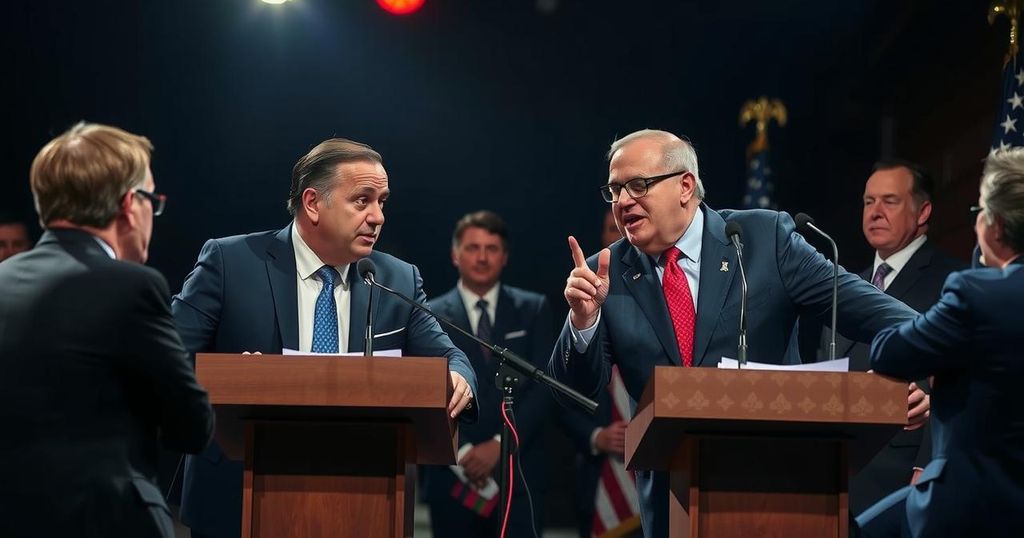Presidential Runoff in Uruguay Highlights Close Contest and Key Issues

Uruguay is undergoing a closely contested presidential runoff between Álvaro Delgado of the National Party and Yamandú Orsi of the Broad Front. Following an inconclusive first round, where the Broad Front secured 44% of the vote compared to 27% for Delgado, both candidates are now addressing public concerns over crime and economic policies. The election is marked by a lack of anti-establishment fervor, contrasting with political climates in other regions.
On Sunday, Uruguay’s citizens participated in a second round of voting to determine their next president, following a closely contested first round where neither candidate secured a majority. Álvaro Delgado, representing the conservative National Party, faces off against Yamandú Orsi of the Broad Front coalition, which held power for 15 years until 2019. The Broad Front’s legacy includes significant social reforms such as the legalization of abortion, same-sex marriage, and marijuana sales in Uruguay, a nation of approximately 3.4 million people.
In the initial voting round held on October 27, the Broad Front garnered 44% of the votes, while the National Party received 27%. Collectively, other conservative parties within the governing coalition, particularly the Colorado Party, amounted to 20%, thus giving Delgado a potential advantage in the runoff. The Congress remains divided following the October elections, and numerous polls indicate a tight race between the two candidates, with nearly 10% of voters undecided.
Political analysts have noted that both candidates have conducted lackluster campaigns amidst a general consensus on pertinent issues. They suggest that this has contributed to widespread voter indecision, in stark contrast to populist movements seen in other countries where anti-establishment sentiments have gained traction. Nicolás Saldías from the Economist Intelligence Unit remarked on the differences in political discourse: “The question of whether Frente Amplio (the Broad Front) raises taxes is not an existential question… That doesn’t exist in Uruguay.”
Both Delgado and Orsi are responding to public concerns regarding rising crime rates, which have become a significant issue in this historically stable nation. While Delgado pledges to implement harsh crime policies and the construction of a new supermax prison, Orsi advocates for a preventative approach that emphasizes community engagement.
Delgado, a veterinarian and experienced politician, is positioning his campaign as a continuation of the favorable policies established by President Lacalle Pou, who cannot seek re-election due to constitutional limits but maintains high approval ratings. With the economy projected to grow by 3.2% this year and inflation showing signs of moderation, Delgado’s strategy focuses on a pro-business agenda and advancing a controversial trade agreement with China.
In contrast, Orsi, who is seen as a successor to the widely respected former president José “Pepe” Mujica, proposes moderate reforms that would attract investments while concurrently addressing social welfare. Mujica, recovering from cancer, lent support to the election process by voting early and emphasized the importance of negotiation in governance within Uruguay’s democratic framework.
While the recently failed plebiscite on pension reforms reflects public reluctance towards sweeping changes, Orsi remains committed to creating a “new left” without instigating drastic transformations. Saldías concluded, “This is a normal election, which is rare. It’s indicative of Uruguay’s strength as a democracy.”
Uruguay has a stable political history, characterized by democratic governance and social reforms. The previous administration of the Broad Front was notable for major legislative achievements which positioned Uruguay as a progressive society in Latin America. However, the recent electoral cycle has introduced tensions, particularly regarding issues of crime and economic policy. With no presidential candidate achieving an outright majority in the initial round of voting, the runoff reflects not only political rivalry but also the electorate’s responses to social challenges and governance efficacy.
The ongoing presidential runoff in Uruguay epitomizes a critical juncture in the nation’s political landscape, where candidates face distinct challenges driven by public apprehensions about crime and economic stability. While Álvaro Delgado seeks to maintain continuity in governance, Yamandú Orsi aims to craft a renewed leftist trajectory. The results of this election may significantly influence Uruguay’s future socio-political climate, underscoring the vitality of democratic processes in the country.
Original Source: www.voanews.com







